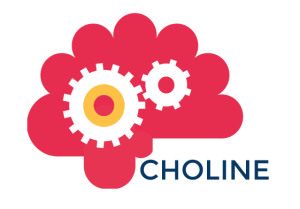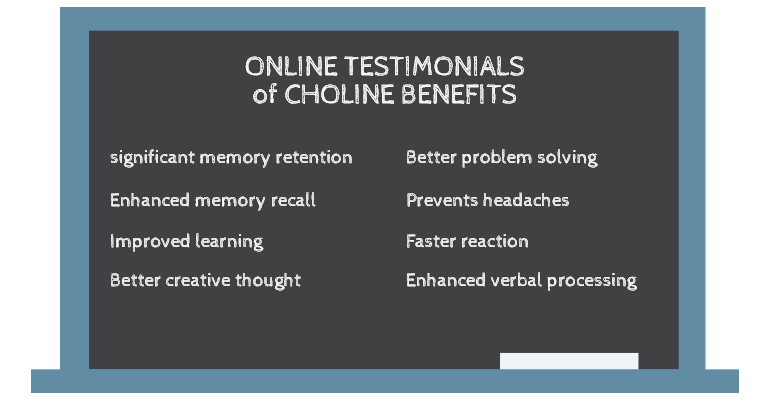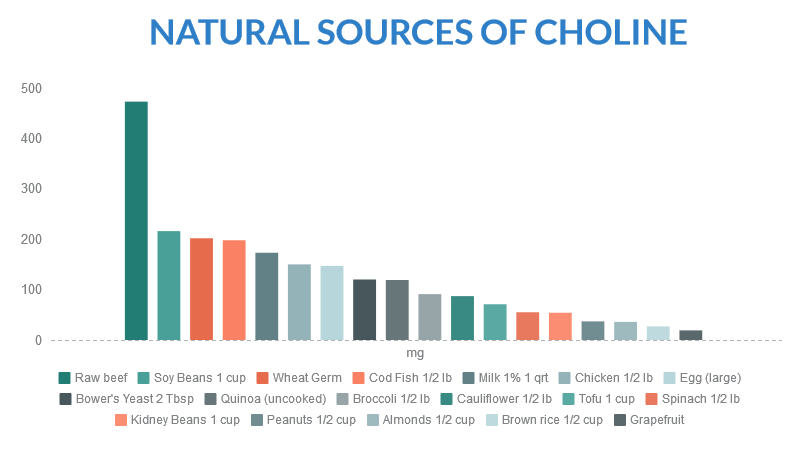 Choline is a water-soluble nootropic which is the precursor molecule for the acetylcholine neurotransmitter, which is used for memory and muscle control. Choline is an essential nutrient and it is used in the synthesis of components in cell membranes. Choline is beneficial for brain health, intelligence and synaptic plasticity.
Choline is a water-soluble nootropic which is the precursor molecule for the acetylcholine neurotransmitter, which is used for memory and muscle control. Choline is an essential nutrient and it is used in the synthesis of components in cell membranes. Choline is beneficial for brain health, intelligence and synaptic plasticity.
Choline is also useful in liver health, as it is able to reduce fatty liver buildup.
Increased acetylcholine can lead to improvements in muscle power and contraction. Acetylcholine is responsible for the creation of memory, retention, recall, planning and focusing.
Choline Benefits
Adult rodent dietary choline deficiency has been shown to worsen memory loss, and diets high in choline appear to reduce memory loss. Older mice who took choline supplementation performed as well as much younger mice. The mice that took the choline supplements showed more dendritic spines per neuron within the hippocampus. This research has not been performed in humans.[1]
Research into the cognitive enhancement benefits of Choline has been largely inconclusive, but the following benefits have been posted on the Reddit Nootropics group.

Choline Supplements
Choline is absorbed from certain foods in our diet (see table below), but approximately 90% of the population does not get the recommended daily amount. A choline deficiency can impair your memory and reasoning causing difficulty in focusing and affecting mood.

Choline supplementation can be used in the treatment of liver disorders, hepatitis, glaucoma, atherosclerosis, and Alzheimer’s disease[2] . Most Alzheimer medications work on the cholinergic system trying to increase stimulation of the acetylcholine receptors on your neurons.
Choline supplements are often taken as a form of ‘smart drug’ or nootropic, due to the role the neurotransmitter acetylcholine plays in various cognition systems within the brain. Choline is a chemical precursor or “building block” needed to produce acetylcholine, and research suggests that memory, intelligence, and mood are mediated at least in part by acetylcholine metabolism in the brain.[4]
Not all types of choline supplements are created equal. The quality and effectiveness of your choline source depends on how well it can cross the brain-blood barrier.
Choline Bitartrate
Choline Bitartrate is the most common choline supplement sold, but it is the least effective since it has the lowest absorption rate. Choline Bitartrate is also the lowest quality of the choline supplement options. This type of choline has to be converted into a lipid in the liver before it can cross the the blood brain barrier.
While it is the most affordable of choline supplements, it is the least effective and is not ideal for acetylcholine conversion.
Phosphatidylcholine
Phosphatidylcholine is a better option than Choline Bitartrate because it already is already attached to a lipid molecule when absorbed into the body allowing it to be used more quickly. While more effective than Choline Bitartrate, it is still not effective enough to provide any cognitive benefits.
Phosphatidylcholine is found naturally foods such as soy beans, fish and meat and soy lecithin supplements.
CDP Choline (Citicoline)
Known as a neuroprotector and a learning enhancer CDP Choline or Citicoline is an excellent choice for choline supplementation, as it is far more potent than phosphatidylcholine and Choline Bitartrate. Its lipid structure allows for effective absorption of the blood brain barrier and it contains the compounds needed by our brain to maintain cell walls and surrounding structures. It is the most popular choline supplement sold today.
Citicoline is currently used as an Alzheimer’s and ADD/ADHD treatment in many countries. Not only does CDP Choline have a positive effect on memory, it also stimulates higher energy levels and increases dopamine receptor density to improve focus and mood.
Alpha GPC Choline
Alpha-glycerophosphocholine (Alpha-GPC or a-GPC) is a cholinergic compound that is used for its cognitive-promoting properties, and to enhance power output in athletes. It appears to also support cellular membranes, and may aid in preventing cognitive decline. Alpha-GPC is the highest quality source of choline, its only downside is that it is the costliest of all choline supplements. It acts faster and is twice as strong as CDP choline.
Alpha-GPC is the most efficient choline supplement in crossing the brain blood barrier and it also appears to support the structure of cellular membranes.
Oral supplementation of alpha-GPC is considered a nootropic because it may enhance cognition (based on rodent testing). High dosages of alpha-GPC (1,200 mg) have been used as a treatment in patients with mild to moderate Alzheimer’s disease and works in conjunction with standard Alzheimer treatments using acetylcholinesterase inhibitors.
Bodybuilders also use alpha-GPC due to its ability to increase growth hormone production. Athletes are at times interested in alpha-GPC due to its ability to enhance growth hormone. It has also been shown to increase power output (requires more evidence).
Cholinergics
Cholinergic are compounds that increase the levels of acetylcholine or choline in the brain. This is usually reserved for compounds that give the body choline (Choline, Alpha-GPC) or inhibit the breakdown of acetylcholine, causing an indirect increase (Huperzine-A).
Cholinergics can be subdivided into compounds which produce Choline in the brain which is the substrate for acetylcholine (in which increasing substrate increases synthesis of acetylcholine) or compounds which act on the enzyme of acetylcholine creation (Choline acetyltransferase) and increasing its actions, or by acting on the enzyme of degradation (acetylcholineesterase) and preventing it from degrading choline. Both of which are mechanisms of increasing choline in the brain independent of substrate concentration. [3]
Choline may slow down the degeneration caused by Alzheimer’s.
Dosages
Doses for choline vary significantly, but usually a dose between 250mg to 500mg once daily is used.
High doses can cause headaches. It is suggested that the users start their choline supplementation with a low dose of approximately 50-100mg, and work their way up to the 250mg once daily dose based on their response.
In another study, chronic (long-term) administration of a choline supplement to rats was found to increase the number of receptor binding sites for acetylcholine in the brain. After 30 days of consuming a diet supplemented with choline chloride, the rats shows a greater density of nicotinic acetylcholine binding sites on neurons in their brain. This means that using a choline supplement actually increased the number of receptors for the acetylcholine neurotransmitter in supplemented rats.
Choline Side Effects
Choline is considered to be a safe nutrient with very low occurrence of side effects and no serious risk factors. It has been given GRAS status (Generally Regarded as Safe) by the US Food and Drug Administration. This means that it has been adequately shown to be safe under the conditions of its intended use, according to FDA standards.
In some cases, if you exceed the recommended choline dosage you may experience diarrhea, nausea, fatigue, higher blood pressure and excessive perspiration. The higher the dosage used, the greater the risk of adverse effects.
Some people develop a symptom called fish odor syndrome due to an individual inability to metabolize trimethylamine which is produced when eating foods with Choline. You can prevent this side effect by using a high quality supplement like Alpha GPC or Citicoline or by reducing your intake to suggested dose levels.
Supplements such as Alpha GPC and Citicoline are excellent sources of this nutrient and improve your memory, learning, logical thinking and concentration abilities. Choline intake is especially important later in life where lower acetylcholine levels precipitate cognitive decline, senile dementia and even Alzheimer’s.
Reference
[1] Zeisel SH. Choline: critical role during fetal development and dietary requirements in adults. Annu. Rev. Nutr. 2006. 26:229–50
[2] Van Beek AH, Claassen JA (January 2010). “The cerebrovascular role of the cholinergic neural system in Alzheimer’s disease”. Behavioural Brain Research 221 (2): 537–542. doi:10.1016/j.bbr.2009.12.047. PMID 20060023.
[3] Cholinergic article on examine.com accessed on 2/15/2016 https://examine.com/supplements/cholinergic/
[4] Coreyann Poly, Joseph M Massaro, Sudha Seshadri, Philip A Wolf, Eunyoung Cho, Elizabeth Krall, Paul F Jacques, and Rhoda Au (2011). “The relation of dietary choline to cognitive performance and white-matter hyperintensity in the Framingham Offspring Cohort”. American Journal of Clinical Nutrition 94: 1584–1591. doi:10.3945/ajcn.110.008938.
https://en.wikipedia.org/wiki/Choline
Leave a Reply